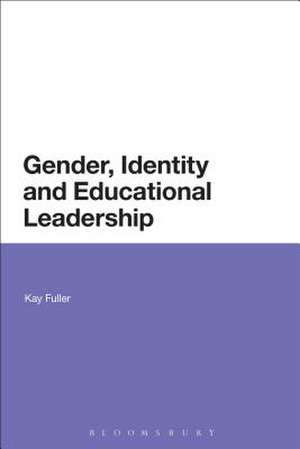Gender, Identity and Educational Leadership
Autor Dr Kay Fulleren Limba Engleză Paperback – 22 apr 2015
| Toate formatele și edițiile | Preț | Express |
|---|---|---|
| Paperback (1) | 256.59 lei 6-8 săpt. | |
| Bloomsbury Publishing – 22 apr 2015 | 256.59 lei 6-8 săpt. | |
| Hardback (1) | 831.43 lei 6-8 săpt. | |
| Bloomsbury Publishing – 9 oct 2013 | 831.43 lei 6-8 săpt. |
Preț: 256.59 lei
Preț vechi: 294.92 lei
-13% Nou
Puncte Express: 385
Preț estimativ în valută:
49.10€ • 53.32$ • 41.25£
49.10€ • 53.32$ • 41.25£
Carte tipărită la comandă
Livrare economică 22 aprilie-06 mai
Preluare comenzi: 021 569.72.76
Specificații
ISBN-13: 9781474234627
ISBN-10: 1474234623
Pagini: 224
Dimensiuni: 156 x 234 x 12 mm
Greutate: 0.32 kg
Editura: Bloomsbury Publishing
Colecția Bloomsbury Academic
Locul publicării:London, United Kingdom
ISBN-10: 1474234623
Pagini: 224
Dimensiuni: 156 x 234 x 12 mm
Greutate: 0.32 kg
Editura: Bloomsbury Publishing
Colecția Bloomsbury Academic
Locul publicării:London, United Kingdom
Caracteristici
Combines gender theory with Pierre Bourdieu's thinking tools of habitus, field, capital, misrecognition and symbolic violence to analyze the interplay between social identity and educational leadership.
Notă biografică
Kay Fuller is Associate Professor of Educational Leadership in the Centre for Research in Educational Leadership and Management at the University of Nottingham, UK.
Cuprins
Acknowledgements List of tables1. Context and Rationale2. Gender and Educational Leadership3. Values-led Leadership 4. What Diversity Means to Headteachers: Gender5. What Diversity Means to Headteachers: Social Class6. What Diversity Means to Headteachers: Ethnicity7. ConclusionReferencesAppendicesIndex
Recenzii
Kay Fuller has provided a thought-provoking and insightful analysis of the intersectionality of gender, identity and educational leadership. Drawing on post-structuralist theories and interview data with female and male school leaders, Kay traces ways in which personal histories and contexts impact on head teachers' professional lives and understandings. Importantly, the misrecognitions that Kay documents offer researchers in the field a challenging agenda for future work.
This book advances the study of educational leadership. Kay Fuller takes forward our thinking and understanding of gender, class and ethnicity as they relate to the role and function of the head teacher using a theoretical framework that breaks fresh ground for the field. I commend this book to all those concerned with social justice in educational leadership.
Kay Fuller is researching and writing within an important tradition in socially critical leadership studies. This book enables the voices of professionals to speak loudly about gender, race and social class, and in ways that illuminate the relationship between values and practice. At a time when we are all meant to make a difference through delivering measurable outcomes, Kay Fuller demonstrates that this cannot take place without a theory and practice of difference. The field of educational leadership must now do research and professional preparation differently as a result of this book, where training and development has to begin with diversity and intersectionality.
This book advances the study of educational leadership. Kay Fuller takes forward our thinking and understanding of gender, class and ethnicity as they relate to the role and function of the head teacher using a theoretical framework that breaks fresh ground for the field. I commend this book to all those concerned with social justice in educational leadership.
Kay Fuller is researching and writing within an important tradition in socially critical leadership studies. This book enables the voices of professionals to speak loudly about gender, race and social class, and in ways that illuminate the relationship between values and practice. At a time when we are all meant to make a difference through delivering measurable outcomes, Kay Fuller demonstrates that this cannot take place without a theory and practice of difference. The field of educational leadership must now do research and professional preparation differently as a result of this book, where training and development has to begin with diversity and intersectionality.











